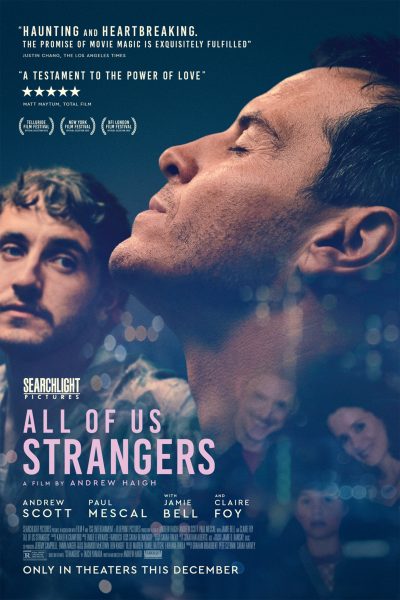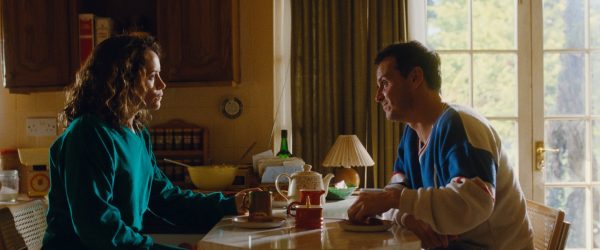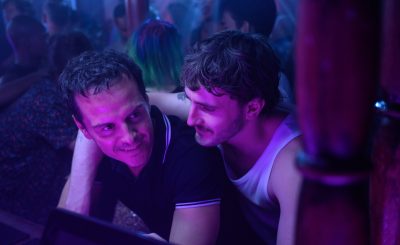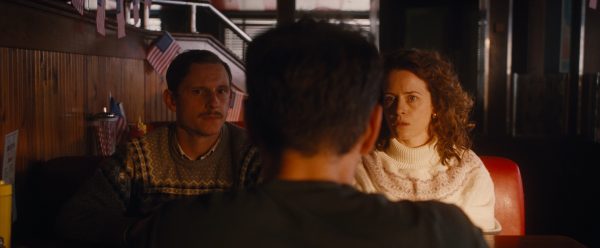‘All of Us Strangers’ celebrates the enigmatic power of love

“All of Us Strangers” (2023). Cast: Andrew Scott, Paul Mescal, Jamie Bell, Claire Foy, Carter John Grout. Director: Andrew Haigh. Screenplay: Andrew Haigh. Book: Taichi Yamada, Strangers. Web site. Trailer.
As expected, Adam exits the building and, once outside, observes from the lack of lights turned on in the structure just how vacant it really is, an ironic metaphor mirroring the state of his own life. Not long after returning to his apartment, though, there’s an unexpected knock at his door. When Adam cautiously opens it, he finds a stranger with an open liquor bottle standing before him. The evidently inebriated visitor, another of the building’s few occupants, a middle-aged gay man named Harry (Paul Mescal), strives to strike up a conversation with his neighbor. Like Adam, Harry is apparently lonely, too. He mentions that he’s seen Adam around the building before but admits that he made no effort to speak with him. This time, however, he coyly attempts a less-than-subtle flirtation. Harry even tries to invite himself in, but his advances go nowhere. Adam politely rebuffs Harry’s offer and says his good nights.

Afterward, however, the surprise incident gets Adam thinking about his existence and what Harry’s impulsive invitation might have led to. In fact, it prompts some concerted soul-searching and reflection about his life in general, going all the way back to the time when he was a young lad (Carter John Grout). He spontaneously then decides to visit the London suburbs where he grew up, including a stop at his childhood home and a meeting with his parents (Jamie Bell, Claire Foy), whom he hasn’t seen for some time. The three of them get caught up on what’s been happening in Adam’s life. He informs them about what he’s been doing, including his career accomplishments and personal life – things that one might think they should already know about. But, then, that in itself shows just how long they’ve not been a part of Adam’s life. Thus begins a surreal journey into the lives of these three long-separated family members – and how that separation has played out in Adam’s existence and shaped his outlook on life. It reveals just how lonely he is – and how he got that way.
Adam’s interaction with his parents proves valuable in many ways, however. It helps him heal from his loneliness. It helps him bring closure to their longstanding unexpected estrangement. And it helps him reassess the new possibilities now open to him, both for himself and, potentially, with Harry. And the key to making all this happen is that aforementioned enigmatic force – love.

Of course, it’s not just love in itself that can accomplish all this. It depends on what we do with it, which, in turn, is driven by what we think and believe about it. And that’s crucial considering the role that our beliefs play in manifesting the reality we experience, the product of the conscious creation process, the philosophy that maintains these intangible resources are responsible for the materialization of the world around us. It’s hard to say how many of us are aware of this school of thought and how it can be employed, but it nevertheless offers us many choices and possibilities, especially in terms of how we make use of it in creating what we experience. And, when there are opportunities for us to employ it in significantly meaningful ways, it can be a viable option for bringing about what we want – and need – to make our lives better.
Before making our lives better, however, we must first grasp where we stand with regard to this force, and that’s something Adam must do for himself before he begins making any changes. As the film opens, he obviously recognizes that things aren’t quite what they should be, but he doesn’t seem to be able to specifically identify what’s wrong (hence his lingering ennui) or how to change it. However, when Harry appears, he begins to get a sense of how his circumstances might be rectified, even if he’s initially cautious and skeptical and takes no action to move forward. That hesitancy, however, gets the ball rolling with his analysis of his status and his search for answers. And, fortunately for him, he has enough insight to recognize that examining his life – and how he got there – is the key, specifically assessing the question of his feelings about love and what altering them might do for him.
Before long, when he visits his past and his relationship with his parents, he begins the process of exploring this subject. One meeting with Mum and Dad soon leads to others, both individually with each of them and collectively with both. And the revelations that come about through those sessions show Adam aspects of himself and his outlook on life that he hadn’t previously recognized or considered. Not only does this enable Adam to reconcile himself with his past, but it also provides him with the means to confidently move forward with a renewed connection with Mum and Dad and a loving and fulfilling relationship with Harry. These perceptions allow him to get in touch with his beliefs and help him understand how and why his existence has unfolded as it has. That’s a big step for someone who has been lost and directionless for some time, especially when it comes to getting the most out of a life that has otherwise seemed largely empty.

But there’s more to it than this. Adam heals from what’s been a sometimes-troubled past, a development that helps him get over what has been holding him back all along. He sees this through his interactions with his past, his parents and his younger self, as well as his involvement with Harry, who has experienced a comparably troubling past and is himself also looking to heal. These circumstances essentially provide Adam with a highly personal mirror to scrutinize himself to see where his existence has gone awry and how he might fix it going forward. At the same time, this scenario has provided him with the means to help heal others by healing himself and using that experience to make a difference in their lives. And it all stems from his beliefs about love and how he embraces them. That’s quite a powerful tonic indeed, one we can all draw upon in making matters right in our own lives when the need arises, something that many of us can likely relate to these days.
In a movie awards season that has had more misses than hits, it’s gratifying to see a picture that not only lives up to, but exceeds, its potential. Such is the case with writer-director Andrew Haigh’s latest offering, a heartwarming and heartbreaking story of love, reflection and healing all rolled into one, based on the 1987 novel Strangers by Taichi Tamada. To say too much more about the film would invariably lead to a plethora of spoilers, but suffice it to say that it delivers the goods on virtually every front. This is one of those pictures that’s just about perfect in nearly every regard thanks to its stringent adherence to authenticity in the writing and the affecting portrayals of its characters by its positively stellar cast, especially the highly underrated performance by Foy, who, save for a BAFTA Award nomination for best supporting actress, has puzzlingly flown largely under the radar. It’s also a production that will likely surprise viewers in myriad ways, defying expectations in telling a story that’s anything but apparent from what’s in its promotional trailer, not to mention in its initial sequences and their depictions of what’s actually going on. Moreover, I’m impressed by the fact that this is an offering featuring gay characters in which their sexuality is not the principal focus of the narrative, something that truly distinguishes this feature from so many others in this genre. Granted, their orientation is part of the story, but it’s not the story; that belongs to the force of love at work in the lives of the principals. Add to these noteworthy attributes a sensitively chosen soundtrack and some surprisingly innovative cinematography, and you’ve got one helluva fine movie. To be sure, this is one of those releases that, if it doesn’t touch you profoundly, you’d better check to see if you have ice water coursing through your veins. This superb offering richly deserves whatever accolades it receives. It’s one of the year’s best, bar none.

“All of Us Strangers” has received its share of honors in this year’s awards season, most notably six BAFTA Award nominations, including best British film, best director, best adapted screenplay, best casting, best supporting actor (Mescal) and best supporting actress (Foy). It has also earned three Independent Spirit Award nods for best feature, director and lead performance for Scott, who also captured a Golden Globe Award nomination for best dramatic actor. In addition, the film received a Critics Choice Award nomination for best adapted screenplay while also being named one of 2023’s Top 10 Independent Films by the National Board of Review. With all these accolades, however, it’s truly mystifying how this title failed to earn any Oscar nominations, a major, inexplicable and inexcusable snub. Nevertheless, despite this oversight, this is a picture well worth seeing in its current theatrical distribution.
Copyright © 2024, by Brent Marchant. All rights reserved.



